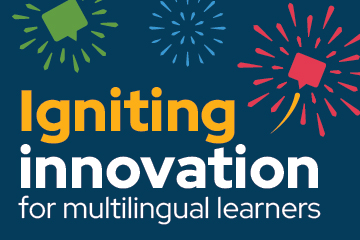Resources/Recursos
Featured Resources



All resources/Todos los recursos
Filter resources by:
Resources/Recursos
Young Multilingual Children in Minnesota
In this study, completed for the Minnesota Department of Education, we explore the perceptions, experiences and decision-making of 15 parents of young multilingual children, ages birth to 5 years. The focus revolves around children’s language learning and development, family engagement practices and children’s participation in early care and education (ECE) programs.
Published 2020
Resource Details View Download NowReleased May 2020
Young Multilingual Children in Maryland
In this study, completed for the Maryland State Department of Education, we explore the perceptions, experiences and decision-making of 27 parents of young multilingual children, ages birth to 5 years. The focus revolves around children’s language learning and development, family engagement practices and children’s participation in early care and education (ECE) programs.
Published 2020
Resource Details View Download NowReleased May 2020
Examining the Relationship Between the WIDA Screener and ACCESS for ELLs Assessments
This report describes a study that examined to what extent scores on WIDA Screener predict scores on ACCESS for ELLs. Researchers found that Screener scores are strongly predictive of ACCESS scores, even when a variety of individual factors are accounted for.
Published February 2020
Authors: David MacGregor, Narek Sarakyan
Released February 2020
Less Than Four Domains: Creating an Overall Composite Score for English Learners with Individualized Education Plans
The analysis in this report illustrates models and procedures that can be used to assign a missing domain score in order to calculate an overall composite score. These methods only apply to assessments taken by English learners whose IEPs or 504 plans require they not be tested in one or more domains.
Resource Details View Download NowReleased March 2019
Investigating K-12 English Learners' Use of Universal Tools Embedded in Online Language Assessments
This study examined how English learners in Grades 1-12, with and without disabilities, used online accessibility features during an ELP assessment. These accessibility features are designed to provide the necessary support for the general EL population, including ELs with disabilities.
Published March 2019
Authors: Ahyoung Alicia Kim, Meltem Yumsek, Mark Chapman, H. Gary Cook
Released March 2019
Exploring the Long-term English Learner Population Across 15 WIDA States
This research report summarizes findings from a recent WIDA study exploring the potential long-term English learner (LTEL) population across 15 geographically-representative WIDA member states during the period 2009-10 through 2014-15. The findings highlight a continuing need for research that rejects an overly simplistic understanding of the LTEL designation. Additionally, future research should more carefully examine how educational systems, practices, and policies structure the experiences and diverse trajectories of students identified as LTELs.
Published October 2018
Authors: Narek Sarakyan and Sarah Ryan
Released October 2018
Evaluating Teacher Effectiveness Using ACCESS for ELLs
Regardless of the growth model, aggregate test-score-based models of student growth require large and longitudinally connected samples of student data. When sample sizes are small it becomes impossible to reliably estimate and disentangle district, school and teacher effects from student growth data.
Published June 2015
Author: Narek Sahakyan
Released June 2015
Examining Relationships Between Alternate Access and State Alternate Assessments
This report examines how Alternate ACCESS for ELLs serves as a tool that identifies English proficiency attainment for English learners with significant cognitive disabilities.
Published December 2014
Author: H. Gary Cook
Released December 2014
Examining District-Level Growth Using ACCESS for ELLs
This research report provides a description of a study examining school districts in the WIDA Consortium whose English language learners (ELLs) exhibit consistently high growth on the ACCESS for ELLs (ACCESS) assessment.
Published August 2014
Authors: Narek Sahakyan, H. Gary Cook
Released August 2014
WIDA MODEL Technical Report Grades 6-8 and 9-12
This 2012 report describes the development, validity and reliability of the WIDA MODEL assessment for Grades 6-8 and 9-12.
Resource Details View Download NowReleased July 2014
High Quality Professional Development for English Language Learners
This report describes key components of high quality professional development for educators of English language learners.
Published May 2014
Author: Daniella Molle
Released May 2014
Implementation of the English Language Proficiency Standards Across the WIDA Consortium
This study examined the ways in which educators across the WIDA Consortium use WIDA’s English language proficiency standards, and in particular the model performance indicators (MPIs).
Published May 2013
Author: Daniella Molle
Released May 2013
Title III National Evaluation Supplemental Report
This report addresses three primary questions:
1. How do you determine a meaningful English language performance standard?
2. How do you establish a realistic, empirically anchored time frame for attaining a given ELP performance standard?
3. How can states take into account English learners’ English language performance level when setting academic progress and proficiency expectations?
Published May 2013
Resource Details View Download NowReleased May 2013
Collaborating with States on Professional Development Planning
This study investigated a coaching process in which state educational representatives (SEAs) and WIDA staff engaged during 2012. The purpose was to enhance the quality of the professional development offered by states to their educators.
Published May 2013
Authors: Daniella Molle, Christie Reveles
Released May 2013
Examining How To Establish English Proficiency Using Alternate Composite Scores
The goal of the analyses presented here is to identify a procedure for creating alternate composite scores on English language proficiency assessments without using all four domain test scores (i.e., listening, speaking, reading and writing).
Published April 2013
Author: H. Gary Cook
Released April 2013
WIDA MODEL Technical Report Grades 1-2 and 3-5
This 2012 report describes the development, validity and reliability of the WIDA MODEL assessment for Grades 1-2 and 3-5.
Resource Details View Download NowReleased May 2012




